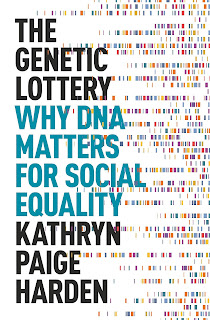Kathryn Paige Harden has to tread carefully. Any mention of linking genetics and ability is liable to face an instant accusation of resorting Galtonesque eugenics. However, Harden espouses what she calls anti-eugenics. It is not enough, she suggests to be genetics blind. If we really want equity of opportunity, we need to try to level out genetic favourability just as much as we should try to deal with the impact of social deprivation on opportunity.
Harden shows in some detail how it is possible to discover the level of genetic contribution to anything from height to educational attainment. And though this may well only contribute 10 to 20 per cent of the difference, it has a bigger influence than does, for example, how rich mummy and daddy are. She also makes it very clear that this has nothing to do with race. Although there are some relatively minor genetic differences between groups of people which tend to be labelled as races (the concept of race itself is totally non-scientific), they are trivial compared with genetic differences where these labels don't apply.
Although Harden writes in quite a personal fashion, I did find the text difficult to read - it works around points at length, often without really coming down to a clear conclusion. The reader gets a feeling of where she is going, but it's hard to pin down clear ways forward. She tells us, for example, of the uselessness of a communist regime's levelling down approach to dealing with inequity - but doesn't really give a practical path for doing anything in modern Western society, particularly in the US, with the exception of overhauling its ridiculous healthcare system.
Harden often uses religious examples or metaphors, and to some extent, this book seems like the John the Baptist of the genetic lottery and how to deal with it - it lays some of the groundwork, but doesn't really tell us how to get there. Like many books on climate change, it's a lot better on the problem than the solution. Even so, it is a real eye-opener and an important book. For too long we have assumed that if we could fix the unfairness in the system, we would be fine having a hierarchy based on genetic ability - reward based on talent. Harden underlines the unfairness of this approach, while still recognising that we want the selection of people doing a job like an airline pilot or surgeon to be based on what they can deliver, rather than equity of outcome. It may be that we can never square this particular circle. But it's a topic that benefits from discussion.
| Hardback: |
| Bookshop.org |




Comments
Post a Comment